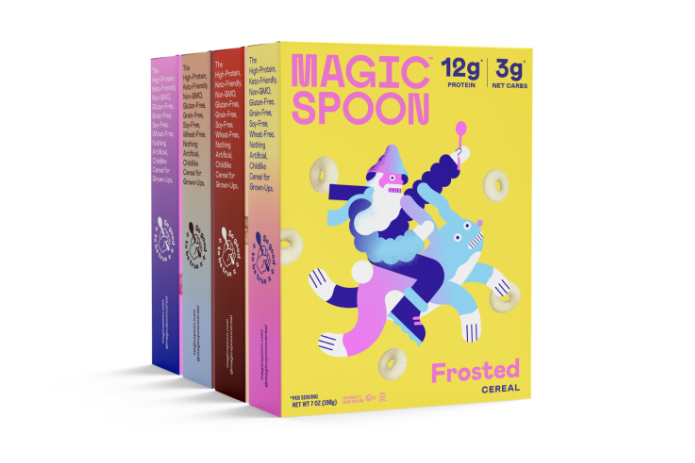
When four boxes of a new product called Magic Spoon arrived at my door last month, I remembered the last time I purchased cereal in bulk — it was the Costco supply of Fiber One I brought to college, thinking it would give me immunity from the freshman 15 when really all it gave me was a fart problem.
But even for someone who’s since caught on to insidious food marketing, Magic Spoon seemed enticing. The pastel-streaked packaging was very neo–Lisa Frank, and the nutrition facts promised keto-friendliness — I’m a friend of keto — with only three grams of net carbs per half-cup serving (in addition to high protein; no gluten, grains, soy, or wheat; and a pretty pronounceable ingredients label).
I poured my first bowl, beginning with the cinnamon flavor (the other three options are frosted, cocoa, and fruity). It tasted delicious, as cereals tend to do — in this case, like a shimmery space Cheerio, weightless and crunchy and sweet and the texture of kinetic sand as it stuck to the inside of my teeth (somehow not in a bad way). Then, an hour or two later, I waited for it to give me a hunger spike, as cereals also tend to do. Except this one did not. I continued with the experiment for 14 almost-consecutive days, alternating among the four flavors, always with a bit of hemp milk (my favorite), sometimes with a portion size of more like two cups. The result? I almost never thought of food again until lunchtime.
It should be mentioned that I’ve become increasingly aware, in my mid-30s, of how my body reacts to different foods at different hours — about two years ago, I mostly gave up even the most lightly processed of morning carbs in favor of wild-caught sardines. I’m not saying that Magic Spoon is more satiating than sardines (nor that my eating habits are sane), but I am saying that, at $39 per case and roughly $1.39 per bowl — perhaps the least amount of money I’ve ever spent in the name of “health” — the cereal definitely sustained me longer than even the most paleo of overpriced granolas, though compared to an ordinary box of high-carb cereal, yes, it’s about twice as expensive.
According to the box, the “magic” in Magic Spoon is a “rare sugar” named allulose, “found in raisins, figs, and maple syrup.” It tastes and feels like regular sugar but with only a tenth of the calories and — because it is not metabolized by your body (most of it comes out in your urine) — none of the elevated blood-sugar levels. The FDA made an unprecedented ruling last month to the effect that allulose no longer needed to be counted toward the total sugar on the ingredients panel, in part because “it produces negligible effects on blood glucose and insulin.”
Curious about a professional’s take on allulose, I brought it up with a doctor, Rocio Salas-Whalen, an NYU-affiliated endocrinologist whose patients include many diabetic and obese patients. She was cautious. Yes, there have been (very limited) studies in which allulose appeared to lower insulin levels, with some of the data suggesting that allulose might compete with the glucose in your gut and block it from being absorbed into your blood, but those studies mainly involve dogs and rats. The few human studies have encompassed only tiny groups of test subjects. “Twenty patients are not enough to say that this is a significant result,” Salas-Whalen notes.
And though allulose is found in trace amounts in raisins and figs, Salas-Whalen stresses that consuming it is “not like you’re eating a raisin or a fig. It’s derived from corn. It’s still man-made.” We should note, too, that Tate and Lyle, a manufacturer of allulose that petitioned the FDA for the April ruling, is also the same company that brought us Splenda.
Time will tell whether allulose becomes embattled the way other sugar substitutes have after the initial excitement. In the meantime, I couldn’t help but order another shipment (available exclusively on Magic Spoon’s website; its founders, incidentally, pivoted from a prior venture selling cricket-based energy bars). Sure, there are reasons not to go all in on allulose, but sometimes — especially within certain parameters that give you the illusion of control — it’s nice to feel young again. Plus, it’s not like you can eat sardines every day.
The Strategist is designed to surface the most useful, expert recommendations for things to buy across the vast e-commerce landscape. Some of our latest conquests include the best acne treatments, rolling luggage, pillows for side sleepers, natural anxiety remedies, and bath towels. We update links when possible, but note that deals can expire and all prices are subject to change.








